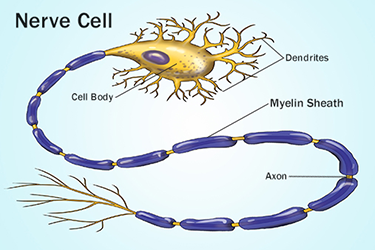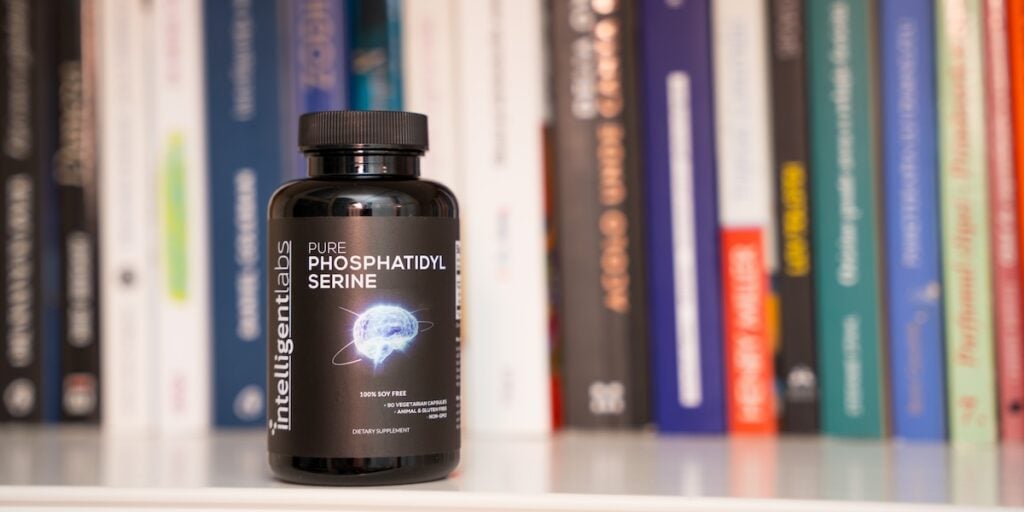What is phosphatidylserine, and why does it matter? Well, it might be one of the most underrated nutrients for brain health. Whether you’re exploring ways to stay sharp or simply want to understand what makes your brain tick, phosphatidylserine is a great place to start! In this guide, we’ll break down what phosphatidylserine is and why it’s gaining attention as a natural brain booster.
Table of Contents
What is Phosphatidylserine?
Phosphatidylserine is a type of fat found in every cell of the body, but it’s especially concentrated in the brain. It makes up about 10–20% of the brain’s phospholipids and helps build and maintain healthy cell membranes.1
In the brain, phosphatidylserine is essential for how neurons (nerve cells) work. It supports the myelin sheath, a protective layer that helps electrical signals travel quickly between brain cells. It also plays a role in brain cell repair and overall function.2

Even more importantly, phosphatidylserine helps regulate key brain chemicals (called neurotransmitters) that affect how you think and feel. These include: 3 4 5
- Acetylcholine for memory and focus
- Dopamine for motivation and concentration
- Serotonin for mood and sleep
- Norepinephrine for energy and alertness
When phosphatidylserine levels drop, which naturally happens with age, memory, focus, and stress management can take a hit.6 7 Supplementing with phosphatidylserine may help slow down age-related memory loss, improve focus, and bring cortisol (your main stress hormone) back into balance, especially during chronic stress.8 9
Want to know how to choose the right phosphatidylserine supplement? Check out our Ultimate Phosphatidylserine Supplement Guide for a full breakdown.
How Phosphatidylserine Works as a Nootropic
Phosphatidylserine is one of the most well-researched natural nootropics, with benefits that go beyond memory. Here’s how the science stacks up:
Supports Memory & Cognitive Function
Multiple studies show that phosphatidylserine supplementation can improve both short- and long-term memory, learning, concentration, and mental clarity. Daily doses between 300–800 mg have been found to slow or even reverse age-related changes in brain cells and enhance cognitive performance in both older adults and younger people.10
In one study, older adults with mild cognitive decline saw improvements in verbal memory, learning speed, visual recall, and even social behavior after supplementing with 300 mg per day.11 12 13 Other research found a 42% increase in word recall among elderly individuals who felt their memory was slipping.14 15
Enhances Focus and Mental Performance Under Pressure
Phosphatidylserine can also boost performance in younger adults. In a study of college-aged men, those who took 400 mg per day for just two weeks performed significantly better on a mental math test. They made fewer mistakes, worked faster, and solved more problems correctly compared to a placebo group.16

Protects the Brain from Age-Related Decline
A 2020 study found that phosphatidylserine helps reduce oxidative stress, which plays a central role in the development of many age-related diseases like dementia, diabetes, cardiovascular issues, and arthritis.17 By improving resistance to oxidative damage, phosphatidylserine may support longevity and brain health as we age.
Stress & Mood Support
One of phosphatidylserine’s standout effects is how it helps balance cortisol, the body’s primary stress hormone. In people with chronically elevated cortisol levels, whether due to age or ongoing stress, phosphatidylserine has been shown to restore healthy hormone balance.18
This cortisol-lowering effect can lead to:
- Improved mood and emotional resilience 19
- Better sleep and reduced sleep disturbances 20
- A potential reduction in risk for cognitive decline and Alzheimer’s disease 20
Support for Active Lifestyles
Athletes may benefit too. Phosphatidylserine can help blunt the spike in cortisol that occurs after intense exercise, reducing muscle soreness and speeding up recovery. It supports a healthier hormonal response to physical stress, making it useful for both performance and long-term health.21 22
Shows Promise for ADHD Symptoms
In children with attention issues, phosphatidylserine may help with focus, memory, and impulse control. One study in Japan found that kids aged 4 to 14 who took 200 mg daily saw noticeable improvements in short-term memory, attention span, and behavior.23
How Much Phosphatidylserine Should You Take for Nootropic Benefits?
A common starting dose for our Pure Phosphatidylserine is 100 mg, taken 3 times a day with meals. This amount has been shown to support memory and overall brain function, especially in people experiencing cognitive decline .24
But everyone’s needs are different, especially when it comes to managing stress. In some studies, people with high cortisol levels needed more, up to 800 mg per day, to see results.25
If you’re using phosphatidylserine for stress, it’s best to start low and adjust gradually. Begin with 100 mg per day, and increase by 100 mg every 4 to 5 days. If you start feeling wired, anxious, or have trouble sleeping, that’s a sign to reduce your dose. Once cortisol levels are under control, you can likely cut back to a lower daily amount.
Conclusion
If you’re looking to support your brain health long-term, Phosphatidylserine is worth considering. And if you want a high-quality, soy-free option made with clinically studied ingredients, check out our Pure Phosphatidylserine supplement. As with any supplement, start low, listen to your body, and adjust as needed.
💬 Got questions or experiences with Phosphatidylserine? Drop a comment below, we’d love to hear from you.
📬 And if you want more science-backed tips on supplements, nutrition, and healthy living, sign up for our newsletter!
References:
- Zanotti, A., Rubini, R., Calderini, G., and Toffano, G., 1987, Pharmacological properties of phosphatidylserine: effects on memory function, in: “Nutrients and Brain Function,” W.B. Essman, ed., Karger, Basel, pp. 95–102. ↩︎
- Abay ZC, Wong MY, Teoh JS, Vijayaraghavan T, Hilliard MA,Neumann B (2017) Phosphatidylserine save-me signals drive functional recovery of severed axons in Caenorhabditis elegans. Proc. Natl. Acad. Sci. USA 114, E10196–E10205. 13. ↩︎
- Kim, H. Y., Huang, B. X., & Spector, A. A. (2014). Phosphatidylserine in the brain: metabolism and function. Progress in lipid research, 56, 1–18. ↩︎
- Crook TH, Tinklenberg J, Yesavage J, Petrie W, Nunzi MG, Massari DC. Effects of phosphatidylserine in age-associated memory impairment. Neurology 1991;41:644–9. ↩︎
- Crook T, Petrie W, Wells C, Massari DC. Effects of phosphatidylserine in Alzheimer’s disease. Psychopharmacol Bull 1992;28:61–6. ↩︎
- Cunnane SC, Schneider JA, Tangney C, Tremblay-Mercier J,Fortier M, Bennett DA, Morris MC (2012) Plasma and brain fatty acid profiles in mild cognitive impairment andAlzheimer’s disease. J Alzheimers Dis 29:691–697. ↩︎
- Suleimanova RR, Hudz EA, Melnychuk DO, Kalachniuk LH(2017) Age-related changes phospholipids of sterlet in liver and dorsal muscles. Ukr Biochem J 89:71–75. ↩︎
- Lee B, Sur BJ, Han JJ, Shim I, Her S, Lee YS, Lee HJ, Hahm DH(2015) Oral administration of squid lecithin-transphos-phatidylatedphosphatidylserineimprovesmemoryimpairment in aged rats. Prog Neuropsychopharmacol BiolPsychiatry 56:1–10. ↩︎
- Monteleone P, Maj M, Beinat L, Natale M, Kemali D, Blunting by chronic phosphatidylserine administration of the stress-induced activation of the hypothalamo-pituitary-adrenal axis in healthy men. Eur J Clin Pharmacol. 1992;42(4):385-8. ↩︎
- Michael J. Glade Ph.D., Kyl Smith D.C., Phosphatidylserine and the human brain, Nutrition 31 (2015) 781–786 ↩︎
- Kidd, Parris. (1996). Phosphatidylserine; Membrane Nutrient for Memory. A Clinical and Mechanistic Assessment. Altern. Med. Rev..1 ↩︎
- Caffara P, Santamaria V. The effects of phosphatidylserine in patients with mild cognitive decline. An open trial. Clin Trials J 1987;24:109–14. ↩︎
- Schreiber S, Kampf-Sherf O, Gorfine M, Kelly D, Oppenheim Y, Lerer B. An open trial of plant-source derived phosphatidylserine for treatment of age-related cognitive decline. Isr J Psychiatry Relat Sci 2000;37:302–7. ↩︎
- Richter Y, Herzog Y, Cohen T, Steinhart Y. The effect of phosphatidylserine containing omega-3 fatty acids on memory abilities in subjects with subjective memory complaints: a pilot study. Clin Interv Aging 2010;5: 313–6. ↩︎
- Richter Y, Herzog Y, Lifshitz Y, Hayun R, Zchut S. The effect of soybean derived phosphatidylserine on cognitive performance in elderly with subjective memory complaints: a pilot study. Clin Interv Aging 2013;8: 557–63. ↩︎
- Parker AG1, Gordon J, Thornton A, Byars A, Lubker J, Bartlett M, Byrd M, Oliver J, Simbo S, Rasmussen C, Greenwood M, Kreider RB, The effects of IQ PLUS Focus on cognitive function, mood and endocrine response before and following acute exercise, J Int Soc Sports Nutr. 2011 Oct 21;8:16. ↩︎
- Kim, B., Park, S. Phosphatidylserine modulates response to oxidative stress through hormesis and increases lifespan via DAF-16 in Caenorhabditis elegans. Biogerontology (2020). ↩︎
- Komori T. The Effects of Phosphatidylserine and Omega-3 Fatty Acid-Containing Supplement on Late Life Depression. Ment Illn 2015;7:5647. ↩︎
- Benton D, Donohoe RT, Sillance B, Nabb S: The Influence of phosphatidylserine supplementation on mood and heart rate when faced with an acute stressor. Nutr Neurosci. 2001, 4 (3): 169-178. ↩︎
- Pistollato, F., Sumalla Cano, S., Elio, I., Masias Vergara, M., Giampieri, F., & Battino, M. (2016). Associations between Sleep, Cortisol Regulation, and Diet: Possible Implications for the Risk of Alzheimer Disease. Advances in nutrition (Bethesda, Md.), 7(4), 679–689. ↩︎
- Starks, M.A., Starks, S.L., Kingsley, M. et al. The effects of phosphatidylserine on endocrine response to moderate intensity exercise. J Int Soc Sports Nutr 5, 11 (2008). ↩︎
- Hellhammer, J., Vogt, D., Franz, N., Freitas, U., & Rutenberg, D. (2014). A soy-based phosphatidylserine/ phosphatidic acid complex (PAS) normalizes the stress reactivity of hypothalamus-pituitary-adrenal-axis in chronically stressed male subjects: a randomized, placebo-controlled study. Lipids in health and disease, 13, 121. ↩︎
- Hirayama S, Terasawa K, Rabeler R, Hirayama T, Inoue T, Tatsumi Y, Purpura M, Jäger R, The effect of phosphatidylserine administration on memory and symptoms of attention-deficit hyperactivity disorder: a randomised, double-blind, placebo-controlled clinical trial, J Hum Nutr Diet. 2014 Apr;27 Suppl 2:284-91. ↩︎
- “Phosphatidylserine,” Examine.com, published on 10 April 2013, last updated on 14 June 2018. ↩︎
- Michael J. Glade Ph.D., Kyl Smith D.C., Phosphatidylserine and the human brain, Nutrition 31 (2015) 781–786 ↩︎





